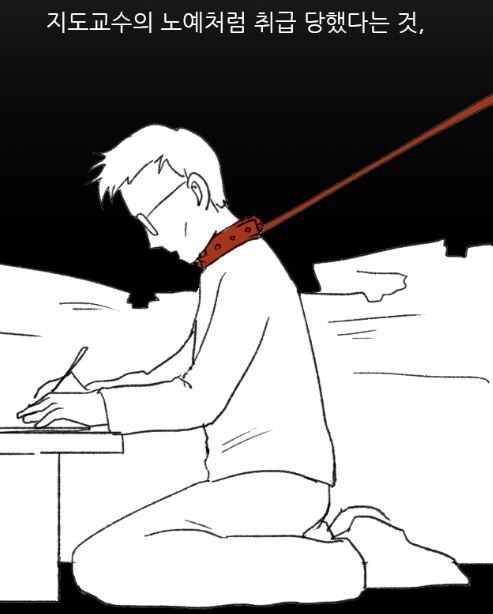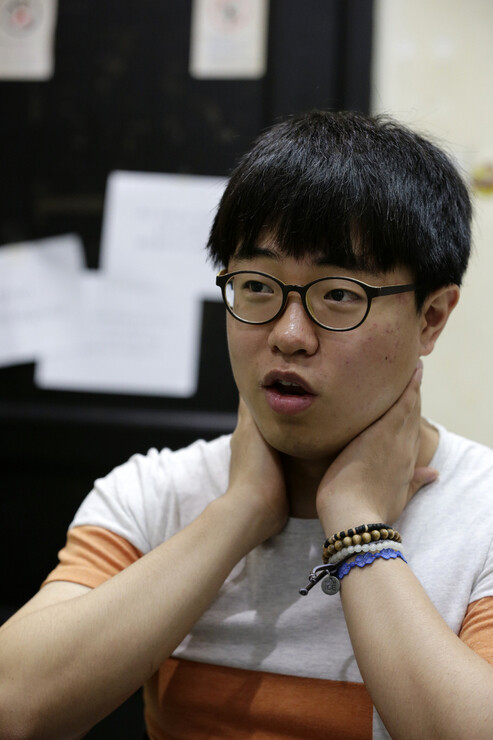hankyoreh
Links to other country sites 다른 나라 사이트 링크
Webtoon blows the whistle on the suffering of S. Korea’s “academic slaves”

A professor launches a two-hour-long torrent of abuse against a teaching assistant who departed for a seminar without waiting for the late-arriving professor. The professor says, “What kind of TA lets the bus go before the professor comes? You’re sorry? If you’re sorry, get on your knees and beg.”
It’s a scene from the first episode in the webtoon “The Sad Face of Graduate Students.” But it isn‘t just a cartoon plot development - it’s an incident that actually happened at Korea University in 2010. The professor in question received a three-month suspension earlier this year for chronic verbal and physical abuse against students.
On June 17 a collection of “Sad Face” episodes was published in book form. The webtoon has already drawn major attention for its stark depiction of a university environment where professors treat their graduate students like slaves. The book features all eleven installments, which were serialized on portal sites between Nov. 2015 and early June of this year.
“If we keep just ignoring the problems of graduate students like we do now, we can never even dream of things like a Nobel Prize in this country,” writes the webtoon’s story writer, 25-year-old Yeom Dong-gyu, in the book’s introduction. Yeom is currently head of the academics bureau of the general graduate school student council at Korea University.
“Solving the problems of graduate student researchers is a matter with direct bearing on the future of South Korean academia and the development of scholarship,” Yeom adds.
“I want to do more than just express how graduate students are slaves to their professors. I wanted to explain why we as a society should be paying more attention to their situation,” said Yeom in the Korea University student council offices on June 24. A graduate of the university‘s Korean literature department, Yeom is currently pursuing a master’s degree. He’s also a critic who made his writing debut with a prize in criticism at the 2014 Daesan University Literary Awards.
All of the webtoon’s episodes show events that actually happened to graduate students.
“People have said, ‘You’re just sensationalizing things, you‘re exaggerating’, but there’s nothing exaggerated or twisted from the accounts we heard - they’ve just been adapted to avoid identifying anyone in particular,” Yeom said.
“In some cases, we trimmed out things that seemed too provocative, and we actually ended up toning it down from what really happened.”
The third installment, titled “Can I go on?” focuses on the issue of male professors sexually harassing female students. In it, a professor tells his student, “You‘re new here. I suppose there are a lot of things you don’t know. I can teach you a thing or two. If you weren‘t my student, I might try something. . . .”
In real life, the professor it was based on also asked the student if she wanted to “go to a motel for some instruction.”
“A lot of the wording for the sexual harassing remarks by professors is exactly as it happened. We heard the stories from students and said to each other, ’They really do hear this kind of stuff every day,‘” Yeom recalled.

Such victimization isn’t just a problem for a few unfortunates - it’s a widespread issue facing graduate students all over South Korea. A 2014 nationwide survey of the research environment for graduate students by the Presidential Committee on the Young Generation found 2,354 of respondents, or 45.5% of the total, reported experience with one or more forms of unjust treatment such as verbal, physical, or sexual abuse; discrimination; being forced to do private work; and copyright infringement. In essence, the webtoon is blowing the whistle on the horrors of a community that remain unknown to anyone who isn’t part of a graduate school.
A major focus is on abuses that border on criminal, including embezzlement of research funding by professors and ghostwriting of research papers. An example can be found in the second installment (“An Understanding Student”), which focuses on research theft: how a paper based on night-and-day experiments acquired “shared authorship” at a single word from an advisor. “Turn it in to [name omitted] as is,” the professor says in the strip.
In one case, a professor ordered a graduate student to list an upperclassman as co-writer for a paper the student had completed on their own. The student knew when they went into the doctoral program that they wouldn’t make money in the field, but believed it was an essential area for human lives.
“You think we’re students?” the upperclassman told the student. “Don’t get confused. We’re slaves. We aren’t popular and we don’t get much research money. We‘re the most servile slaves of all.”
During the webtoon’s serialization, the Korea University student council office became a reporting center for human rights abuses against graduate students all over the country. A “special edition” webtoon scheduled for online publication in the near future focuses on the story of three Sungkyunkwan University students sued by their school over fabrications in a research paper by their professor. The institution demanded 6 billion won (US$5.07 million) from all four - professor and students alike.
“The students sent an email about it. Even though our informants have student councils at their own schools, a lot of them contact us,” Yeom said.
Yeom and the Korea University student council are currently working on the season two serialization, with a target launch date in November.
“More and more people are requesting the kind of data that we used to be the only ones looking at - things like studies on the working environment for TAs or for graduate students. The webtoon has had a lot of impact.”
“I used to be skeptical about how much we could actually change, but now I have hope that we can really change something.”
By Jin Myung-seon, staff reporter
Please direct questions or comments to [english@hani.co.kr]

Editorial・opinion
![[Column] Park Geun-hye déjà vu in Yoon Suk-yeol [Column] Park Geun-hye déjà vu in Yoon Suk-yeol](https://flexible.img.hani.co.kr/flexible/normal/500/300/imgdb/original/2024/0424/651713945113788.jpg) [Column] Park Geun-hye déjà vu in Yoon Suk-yeol
[Column] Park Geun-hye déjà vu in Yoon Suk-yeol![[Editorial] New weight of N. Korea’s nuclear threats makes dialogue all the more urgent [Editorial] New weight of N. Korea’s nuclear threats makes dialogue all the more urgent](https://flexible.img.hani.co.kr/flexible/normal/500/300/imgdb/original/2024/0424/7317139454662664.jpg) [Editorial] New weight of N. Korea’s nuclear threats makes dialogue all the more urgent
[Editorial] New weight of N. Korea’s nuclear threats makes dialogue all the more urgent- [Guest essay] The real reason Korea’s new right wants to dub Rhee a founding father
- [Column] ‘Choson’: Is it time we start referring to N. Korea in its own terms?
- [Editorial] Japan’s rewriting of history with Korea has gone too far
- [Column] The president’s questionable capacity for dialogue
- [Column] Are chaebol firms just pizza pies for families to divvy up as they please?
- [Column] Has Korea, too, crossed the Rubicon on China?
- [Correspondent’s column] In Japan’s alliance with US, echoes of its past alliances with UK
- [Editorial] Does Yoon think the Korean public is wrong?
Most viewed articles
- 1[Column] Park Geun-hye déjà vu in Yoon Suk-yeol
- 2Will NewJeans end up collateral damage in internal feud at K-pop juggernaut Hybe?
- 3N. Korean hackers breached 10 defense contractors in South for months, police say
- 4Thursday to mark start of resignations by senior doctors amid standoff with government
- 5[Guest essay] The real reason Korea’s new right wants to dub Rhee a founding father
- 6Kim Jong-un expressed ‘satisfaction’ with nuclear counterstrike drill directed at South
- 7Up-and-coming Indonesian group StarBe spills what it learned during K-pop training in Seoul
- 8Why Korea shouldn’t welcome Japan’s newly beefed up defense cooperation with US
- 9Opposition calls Yoon’s chief of staff appointment a ‘slap in the face’
- 10Terry Anderson, AP reporter who informed world of massacre in Gwangju, dies at 76